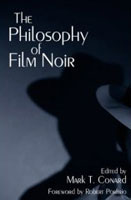
Despite its decline as a continuing genre, Film Noir has had a lasting and significant effect on film. This book, from the University of Kentucky Press, is the best of the Philosophy & Popular Culture series that I have come across, and I can only comment at present on a few of the very deep threads found in this volume. Beyond the interesting use of expressionist cinematography, film noir is fascinating for what it can tell us about the culture from which it came.
The 20th century saw a tremendous change in human society. First, the the advancement of science led to Nietzsche's predicted "death of God" when our scientific values clashed with our superstitions, leading to disorientation. Without a solid foundation for values, tradition lost its meaning. Furthermore, lessons from Kierkegaardian subjectivism and Einsteinian relativism destroyed the possibility of a neutral or objective viewpoint. Secondly, World War II and the following Cold War brought humanity to new levels of destructive behavior and totalitarianism. The victory of WWII was not a complete victory and it was quickly realized that we were less safe than we were before the war. The resulting possibility of instant global war brought on severe anxiety. The European reaction was the development of Existentialism, as well as other connected philosophies such as absurdism. Here in America though the tradition has been to continue on with a sense of optimism (at least superficially). Hence the dread and anxiety of the postwar age was relegated to places like film noir. Thirdly, the economic surge following the war led to a new consumer culture, and this mass production resulted in alienation of people from their communities. The new urban landscape became a Dark City, cold, lifeless and unconcerned with the individual, a land of isolation and anonymity.
R. Barton Palmer discusses this postwar anxiety as the "dark mirror theory", asserting that film noir is a reflection of the bleak national mood. This mood was also manifested in the increase of psychotherapy, pop psychology, and pseudo-science such as UFO sightings. There was also an increased attendance in church, which had been declining in the earlier part of the century, and a Spiritual Revival involving new religious superstars like Billy Graham, as well as a syncretic national religion. Left with no security and an uncertain future, postwar America experienced a desperate hope of escape.
Escape is central to film noir. Stranded in the impersonal city, one is left with a conflict between appearance and reality. Things are not what they seem. People are not who they seem and intentions are often disguised and dark. Culture is transitory, change is constant. Without an ethical system as a reference, decisions become the responsibility of the individual and choice becomes significant. The maze has evolved from classical, being escapable by faith, through mannerist, escapable by reason, to the rhizome, as defined by Umberto Eco [1]. The rhizome has no beginning or end, it has no entrance or exit, no perimeter and no center but always a middle. There is no escape from it. This is the postmodern maze. All that remains is to find meaning in a potentially fatalistic universe. This is the struggle dramatically presented in film noir, although possibly less optimistic than the attitude found in Existentialism.
Perhaps the best postmodern work of recent times is Lost. Here, escape does seem truly impossible. The odds are continually being stacked against the survivors. Even if they escape the island, it is a futile endeavor and they will need to escape back. Beyond their current situation larger forces are at work and, more immediate, they can't escape from themselves, or the past (or the future for that matter). No one is who they seem, alliances are continually changing, and as events progress even individual characters switch from one point of view to another. Alan Woolfolk discusses the nature of time in film noir, asserting that it "merges narrative space, time, and events in such a way as to give priority to time past - someone (or something) is always coming 'out of the past.'" He continues on to say "film noir threatens to subvert the very concept of time, to obliterate the distinction between past, present, future, by placing individuals at the mercy of unknown forces that not only negate simple notions of making a clean break with the past but also deny the very notion of a coherent narrative character development." This description seems quite a propos of Lost to me.
I would argue that Film Noir was the beginning of postmodern film and is therefore tied linearly to our current postmodern culture. It also inseparable from Existentialism, as it comes from the same origins, explores the same themes and reaches the same conclusions.
[1] Discussed by Jerold J. Abrams in the chapter "From Sherlock Holmes to the Hard Boiled Detective in Film Noir"

















![The Brothers Karamazov [Norton Critical Edition]](https://i.gr-assets.com/images/S/compressed.photo.goodreads.com/books/1560399295l/49899120._SX50_SY75_.jpg)





No comments:
Post a Comment